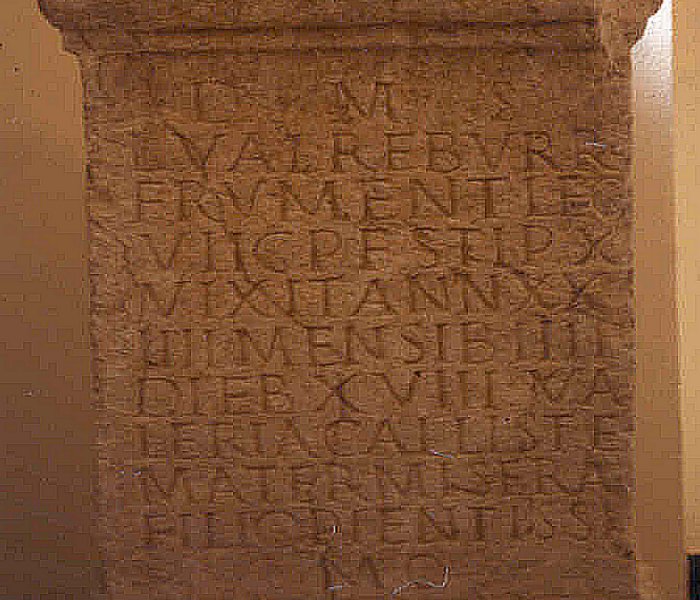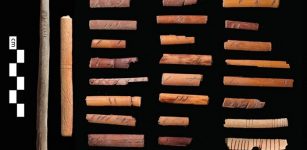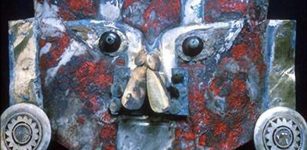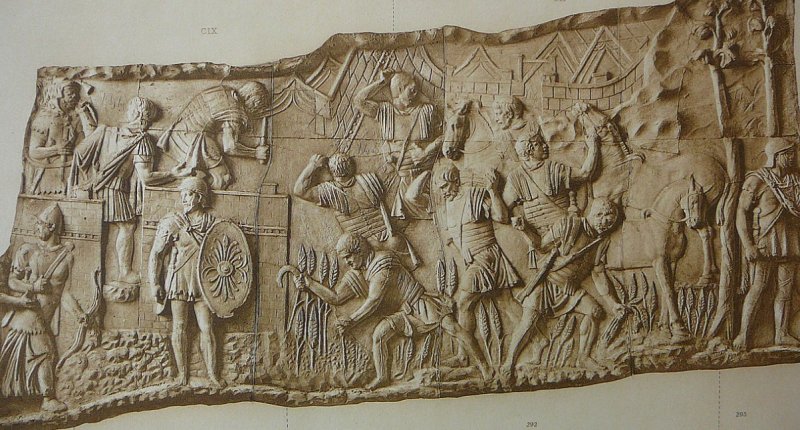Secret Police In Ancient Rome – Frumentarii: Who Were They And What Was Their Role?
A. Sutherland - AncientPages.com - Frumentarii' was a special military elite in Roman Empire that served as the emperor's secret police.
At the turn of the second and third century AD, they watched the actions of senators, high-ranking military men, and Christians.
Some frumentarii take care of the supplies, harvesting the wheat ( Colonna di Traiano , relief n.81). Image credit: Conrad Cichorius: "Die Reliefs der Traianssäule" - Public Domain
Initially, however, they were collectors of wheat in the Roman Empire. They dealt with tax collection and were responsible for controlling and regulating grain deliveries to the capital.
However, their role evolved during Hadrian's reign (117-138 CE); they expanded and focused on internal stabilization. Their tasks also involved arrests of suspected individuals.
The frumentarii' was Emperor Hadrian's special unit of the Praetorians to control the political situation in Rome during the emperor's absence.
His secret police unit had to protect the emperor from possible conspiracies and investigate significant individuals and their lives.
Hadrian wanted to know much, and as he once said, "he wanted to know things that should not be known," which probably applied to the private lives of individuals in his vicinity.
According to Hadrian, knowledge – of whatever sort – was power.
There is very little information about this unit, but ancient inscriptions on gravestones confirm that frumentarii, who always worked in uniforms, were usually attached to individual legions.
They carried out particular tasks in different places and were stationed at the Castra Peregrina in Rome. They did not hide themselves and lived openly. Their uniforms determined their affiliation.
According to studies, the frumentarii unit had high moral and social status and was very proud. The inscriptions on their gravestones attest to it.
 Inscription about a frumentarius from Legio VII Gemina. Image credit: Caligatus - Public Domain
Inscription about a frumentarius from Legio VII Gemina. Image credit: Caligatus - Public Domain
Frumentarii Were Not Entirely Innocent
These officers were disliked by Roman society because, among others, they spied on people.
Due to abuses committed by this secret police, the emperor Diocletian (284-305 CE) dissolved the unit and replaced it with the so-called agentes in rebus ("general agents"). This change was based on the fact that they were recruited from civilians, not military men. The unit contained from 200 to 1000 men.
The changes introduced by Diocletian were unsuccessful, and abuses committed by the frumentarii agents continued. They entirely operated in the Byzantine Empire until the 8th century.
Many were very privileged; as a control organ superior to the local governors, they monitored the entire Roman province.
They were feared depending on their relations, and at the same time, their work was highly appreciated by the emperors who gave them promotions to hold important government positions.
Senior officers who served well and impeccably had opportunities to work in the Praetorian prefectures, where they exercised their control over the bureaucracy.
They had civil and criminal judicial immunity; for example, inspectors performed their functions above the provinces.
Written by - A. Sutherland - AncientPages.com Senior Staff Writer
Updated on October 6, 2023
Copyright © AncientPages.com All rights reserved. This material may not be published, broadcast, rewritten or redistributed in whole or part without the express written permission of AncientPages.com
Expand for referencesReferences:
Speller E. Following Hadrian
Goldsworthy A. The Complete Roman Army
More From Ancient Pages
-
 Ancient Greek Seven-Room Building And Treasures Found Underwater Off The Coast Of Salamis
Archaeology | Nov 1, 2023
Ancient Greek Seven-Room Building And Treasures Found Underwater Off The Coast Of Salamis
Archaeology | Nov 1, 2023 -
 An Ancient Goldsmith’s Unexplained Encounters With The Unknown
Ancient Mysteries | Apr 16, 2019
An Ancient Goldsmith’s Unexplained Encounters With The Unknown
Ancient Mysteries | Apr 16, 2019 -
 How Did The Renaissance Change Europe?
Ancient History Facts | Oct 10, 2019
How Did The Renaissance Change Europe?
Ancient History Facts | Oct 10, 2019 -
 Mighty Viking Harald Hardrada – The Last Great Viking And Most Feared Warrior Of His Time
Featured Stories | Jun 9, 2020
Mighty Viking Harald Hardrada – The Last Great Viking And Most Feared Warrior Of His Time
Featured Stories | Jun 9, 2020 -
 Ancient Maya People Used Volcanic Ash To Build Pyramids When Huge Eruption Occurred
Archaeology | Sep 22, 2021
Ancient Maya People Used Volcanic Ash To Build Pyramids When Huge Eruption Occurred
Archaeology | Sep 22, 2021 -
 28,000-Year-Old Lapedo Child: Human-Neanderthal Hybrid Reveals A Prehistoric Secret
Evolution | Mar 10, 2025
28,000-Year-Old Lapedo Child: Human-Neanderthal Hybrid Reveals A Prehistoric Secret
Evolution | Mar 10, 2025 -
 America’s First Casino Was Created By The Promontory Culture 700 Years Ago
Ancient History Facts | Apr 30, 2016
America’s First Casino Was Created By The Promontory Culture 700 Years Ago
Ancient History Facts | Apr 30, 2016 -
 Monks Mound In Ancient Cahokia Was Not What Scientists Previously Thought – New Study
Archaeology | Jul 21, 2022
Monks Mound In Ancient Cahokia Was Not What Scientists Previously Thought – New Study
Archaeology | Jul 21, 2022 -
 Ancient Underground Tombs And Lightening God In Peru – Complex Concepts Of Death And Renewal Revealed
Archaeology | May 22, 2018
Ancient Underground Tombs And Lightening God In Peru – Complex Concepts Of Death And Renewal Revealed
Archaeology | May 22, 2018 -
 Manx: Ancient Dead Gaelic Language That Refused To Die And Has Been Revived Again
Ancient History Facts | Oct 7, 2016
Manx: Ancient Dead Gaelic Language That Refused To Die And Has Been Revived Again
Ancient History Facts | Oct 7, 2016 -
 Rare 1,600-Year-Old Wooden Pagan Idol Discovered In Ireland
Archaeology | Aug 16, 2021
Rare 1,600-Year-Old Wooden Pagan Idol Discovered In Ireland
Archaeology | Aug 16, 2021 -
 On This Day In History: Tsar Peter The Great Opens New Chapter in Russia’s History – On Mar 19, 1697
News | Mar 19, 2017
On This Day In History: Tsar Peter The Great Opens New Chapter in Russia’s History – On Mar 19, 1697
News | Mar 19, 2017 -
 Unique Medieval Horsemen Sculptures Made By Unknown Creators In India – Puzzling Discovery In The Himalayas
Archaeology | Oct 23, 2017
Unique Medieval Horsemen Sculptures Made By Unknown Creators In India – Puzzling Discovery In The Himalayas
Archaeology | Oct 23, 2017 -
 Rhetorica ad Herennium: Ancient Book That Improves Your Memory Using Method Of Loci – You Can Test It Easily
Featured Stories | Feb 21, 2025
Rhetorica ad Herennium: Ancient Book That Improves Your Memory Using Method Of Loci – You Can Test It Easily
Featured Stories | Feb 21, 2025 -
 On This Day In History: Noah Webster, Jr. “Father Of American Scholarship And Education” Was Born – On Oct 16, 1758
News | Oct 16, 2016
On This Day In History: Noah Webster, Jr. “Father Of American Scholarship And Education” Was Born – On Oct 16, 1758
News | Oct 16, 2016 -
 Andalusia Was First Inhabited By Neolithic People From The Southern Part Of The Iberian Peninsula 6,200 Years Ago
Archaeology | Feb 26, 2024
Andalusia Was First Inhabited By Neolithic People From The Southern Part Of The Iberian Peninsula 6,200 Years Ago
Archaeology | Feb 26, 2024 -
 Ancient Board Game Mancala Can Unlock Cutting-Edge Physics Discoveries
Artifacts | Sep 30, 2023
Ancient Board Game Mancala Can Unlock Cutting-Edge Physics Discoveries
Artifacts | Sep 30, 2023 -
 Red Paint On 1,000-Year-Old Gold Mask From Peru Contains Human Blood Proteins
Archaeology | Nov 1, 2021
Red Paint On 1,000-Year-Old Gold Mask From Peru Contains Human Blood Proteins
Archaeology | Nov 1, 2021 -
 Strange Ancient Artifacts And Foreigners Who Were Not Meant To Be In North America
Ancient Mysteries | Mar 16, 2020
Strange Ancient Artifacts And Foreigners Who Were Not Meant To Be In North America
Ancient Mysteries | Mar 16, 2020 -
 Notre Dame Is On Fire! Can The Magnificent Cathedral Still Be Saved?
News | Apr 15, 2019
Notre Dame Is On Fire! Can The Magnificent Cathedral Still Be Saved?
News | Apr 15, 2019

